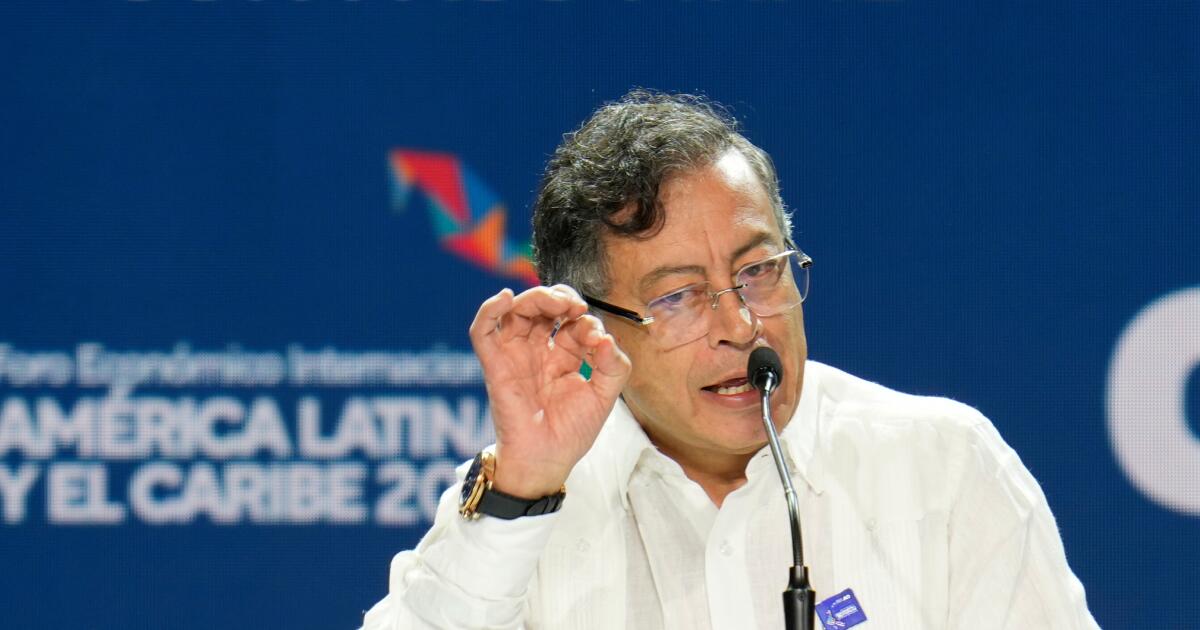Trump and Colombia’s president to meet at White House after months of tension and insults
BOGOTA, Colombia — President Trump is scheduled to host one of his most vocal regional critics, Colombian President Gustavo Petro, at the White House in a high-stakes meeting analysts suggest could redefine the immediate future of bilateral relations.
Petro has called Trump an “accomplice to genocide” in the Gaza Strip, while the U.S. president called him a “drug lord,” an exchange of insults that escalated with U.S. sanctions against Petro, threats of reciprocal tariffs, the withdrawal of financial aid to Colombia and even the suggestion of a military attack.
Tensions eased in early January when Trump accepted a call from Petro, saying it was a “great honor to speak with the president of Colombia,” who called him to “explain the drug situation and other disagreements.”
The two leaders are expected to meet Tuesday to address strategies for curbing drug trafficking and boosting bilateral trade, while potentially discussing joint operations against Colombian rebel groups fueled by the cocaine trade.
“There’s a lot of space here for mutual cooperation and shared success,” said Elizabeth Dickinson, a Colombia expert at the International Crisis Group.
Combating drug trafficking
Decades of security cooperation once made Colombia the primary U.S. ally in the region, but that relationship has recently faced unprecedented strain.
The two countries have opposing views on how to address the problem of illicit drugs. While the U.S. remains anchored in aggressive eradication and supply-side control, Petro advocates for interdiction, demand reduction and providing economic alternatives for small-scale coca farmers.
In 2025, the U.S. signaled its dissatisfaction with Petro’s anti-drug policy by adding Colombia to a list of nations failing to cooperate in the drug war for the first time in three decades.
Since then, Petro has focused on highlighting the record seizures and claiming that his government has managed to halt the growth of coca leaf crops. However, Colombia’s coca crop has reached historic highs, as the government shifts away from eradication. According to United Nations research, potential cocaine production has surged by at least 65% during the Petro administration, to more than 3,000 tons per year.
The Venezuela factor
The sudden detente between Petro and Trump followed a period of extreme volatility.
Tensions peaked after the Jan. 3 U.S. raid in Caracas that captured then-President Nicolás Maduro and his wife, Cilia Flores. Petro denounced the operation as an act of “aggression” and a “kidnapping,” blasting the U.S. for what he called an “abhorrent” violation of Latin American sovereignty and a “spectacle of death” comparable to Nazi Germany’s 1937 carpet bombing of Guernica, Spain.
Despite recently calling for Maduro’s return to face Venezuelan justice, Petro’s tone softened significantly during a subsequent hourlong call with Trump, paving the way for their upcoming summit.
Gimena Sánchez-Garzoli, director for the Andes region at the Washington Office on Latin America, a think tank, believes that Trump accepted Petro’s call partly to quell questions about the operation in Venezuela and the growing concern over warnings issued to countries like Colombia.
She also said she considers it likely that both presidents will agree on actions against drug trafficking and a joint fight against the National Liberation Army guerrilla group, which is most active on the border with Venezuela.
‘A quiet, effective cooperation’
Signaling a thaw in relations just days before the White House summit, the Colombian Foreign Ministry announced on Thursday that repatriation flights for deportees from the U.S. have officially resumed.
Images released by the ministry showed citizens arriving at El Dorado airport — a stark contrast to the diplomatic crisis a year ago. At that time, Petro triggered a near trade war by refusing U.S. military deportation flights over “dignity” concerns, only relenting after Trump threatened 50% tariffs and visa cancellations.
“A good outcome [of the meeting] would be that the relationship is cordial, pragmatic, and that the two countries can get back to what they have been doing for years, which is a quiet, effective cooperation on shared security threats,” Dickinson said.
“The less noise there is around the relationship the better.”
Suárez and Rueda write for the Associated Press.
